2024年人教版中考英语一轮复习七年级下册Units 1-4 讲练(含解析)
文档属性
| 名称 | 2024年人教版中考英语一轮复习七年级下册Units 1-4 讲练(含解析) |
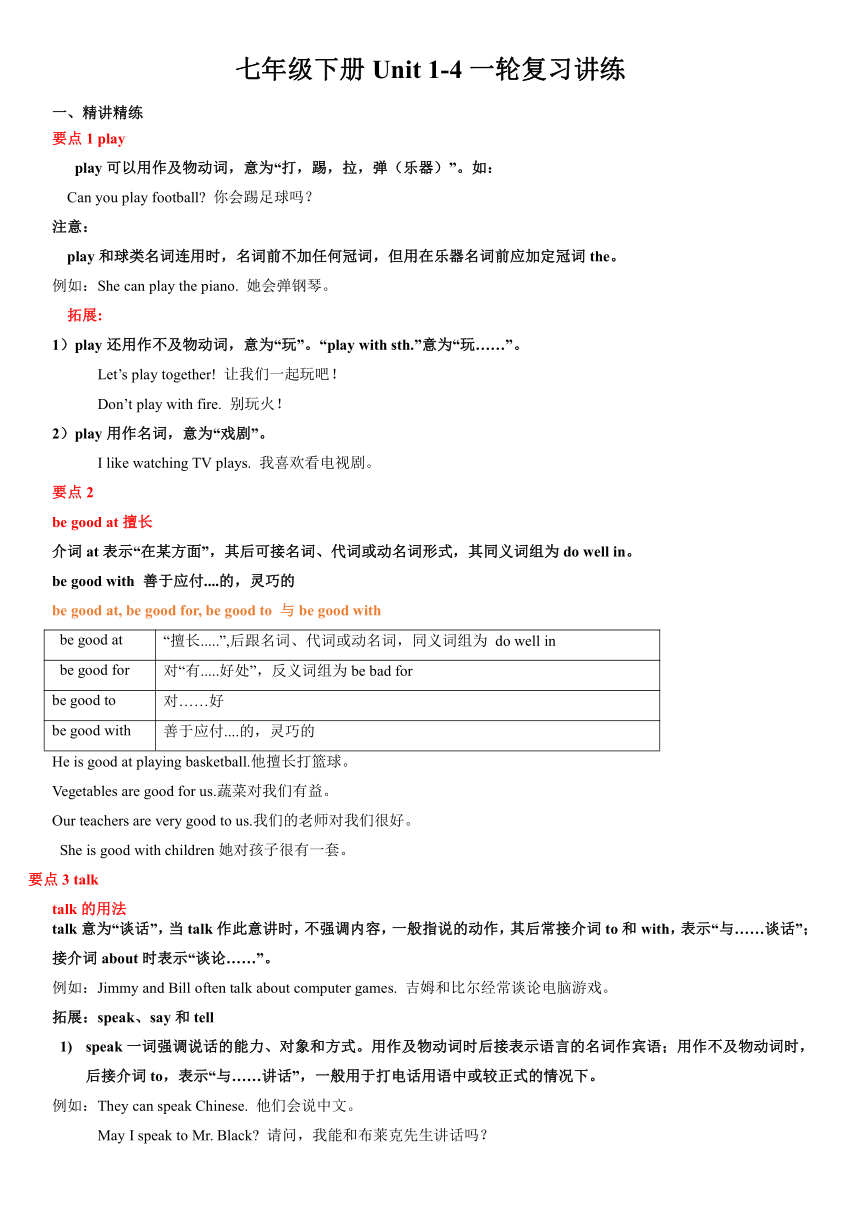
|
|
| 格式 | docx | ||
| 文件大小 | 119.6KB | ||
| 资源类型 | 教案 | ||
| 版本资源 | 人教新目标(Go for it)版 | ||
| 科目 | 英语 | ||
| 更新时间 | 2024-05-17 15:27:16 | ||
图片预览

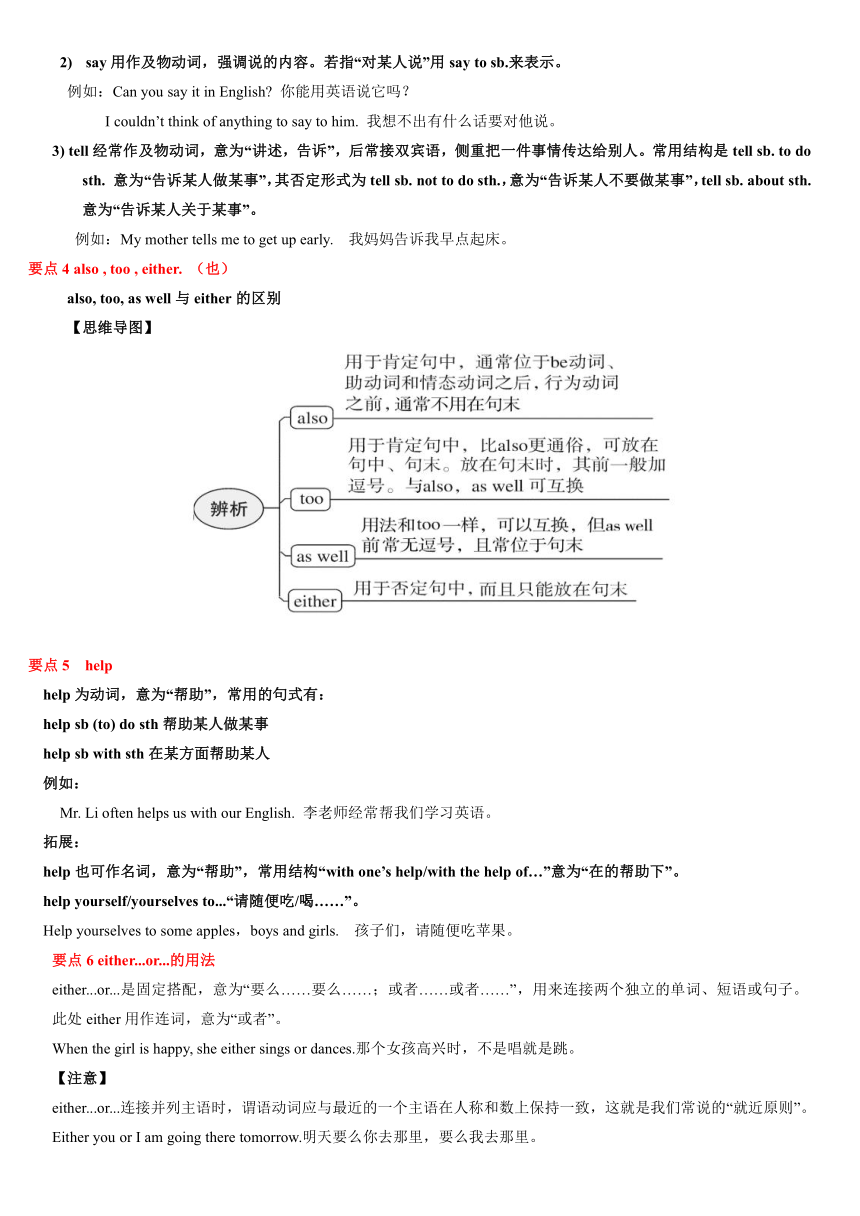
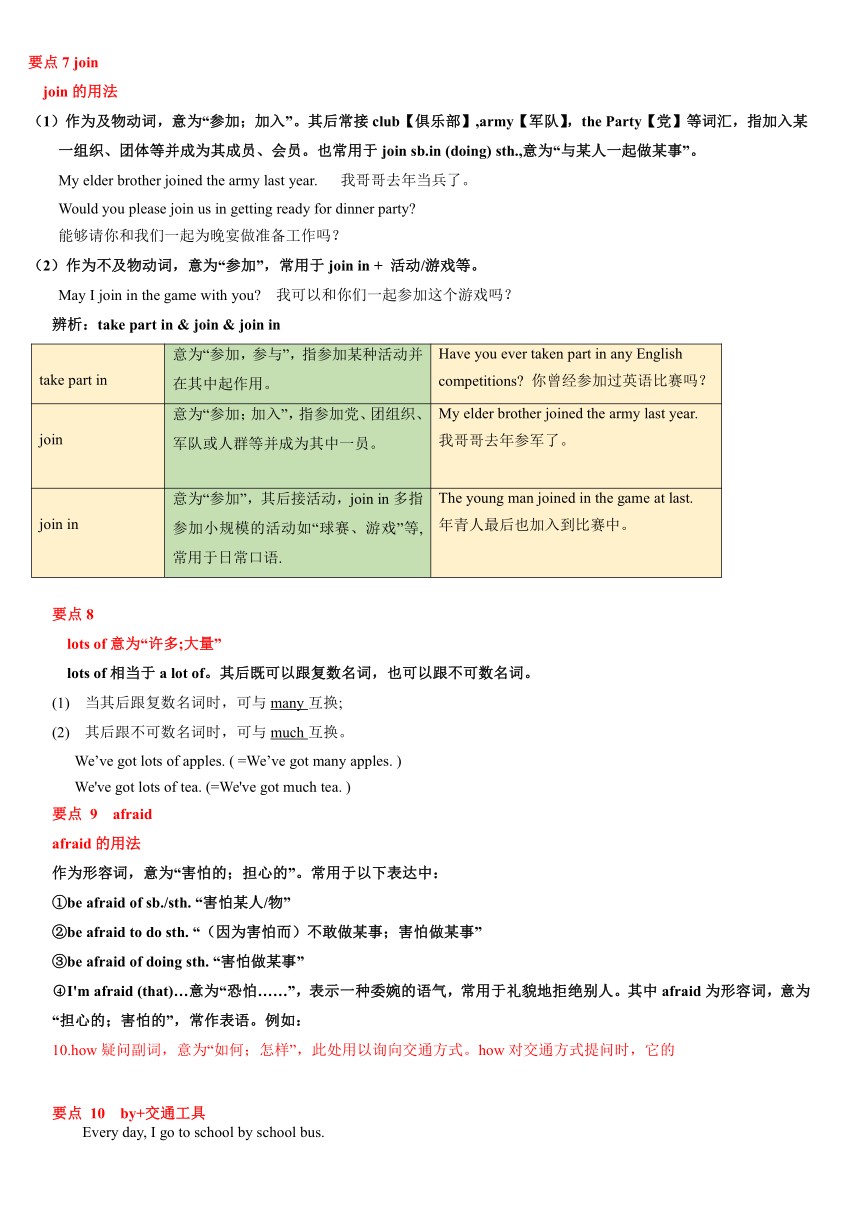
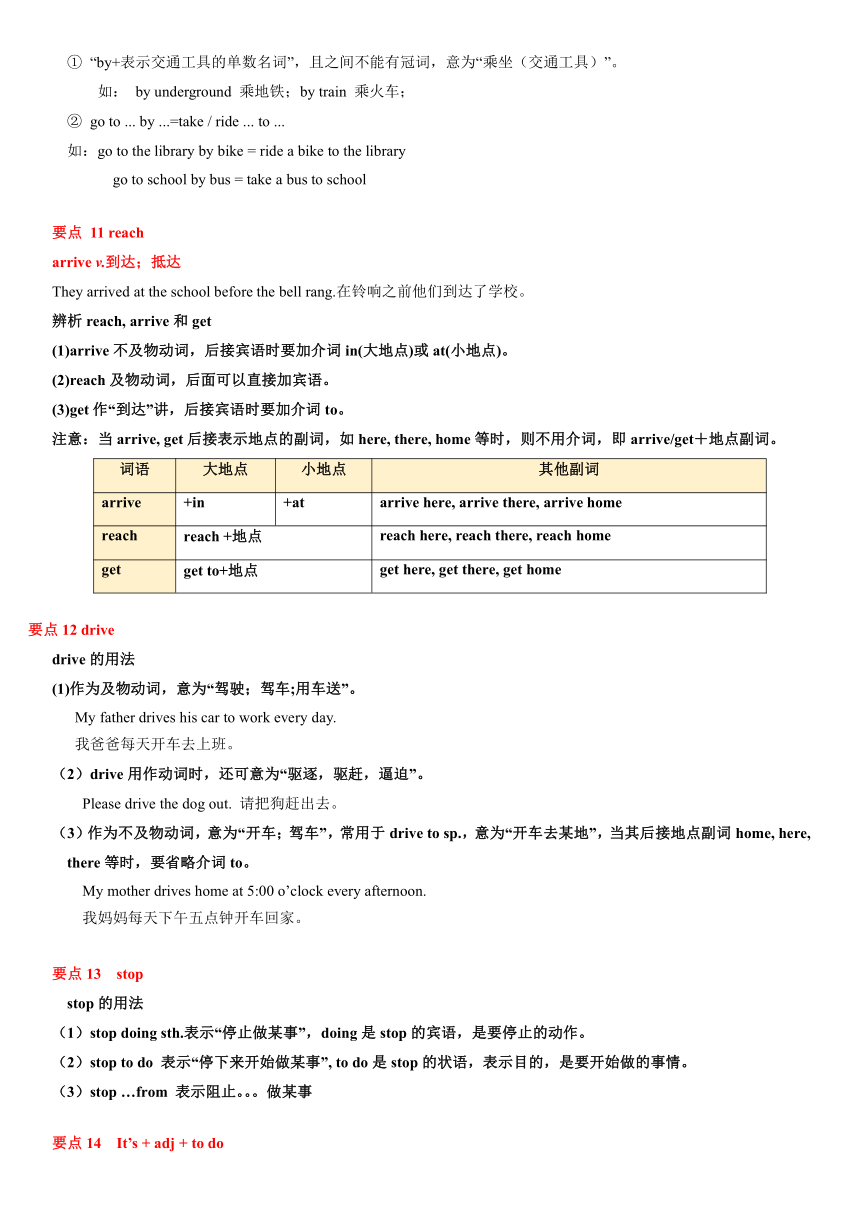
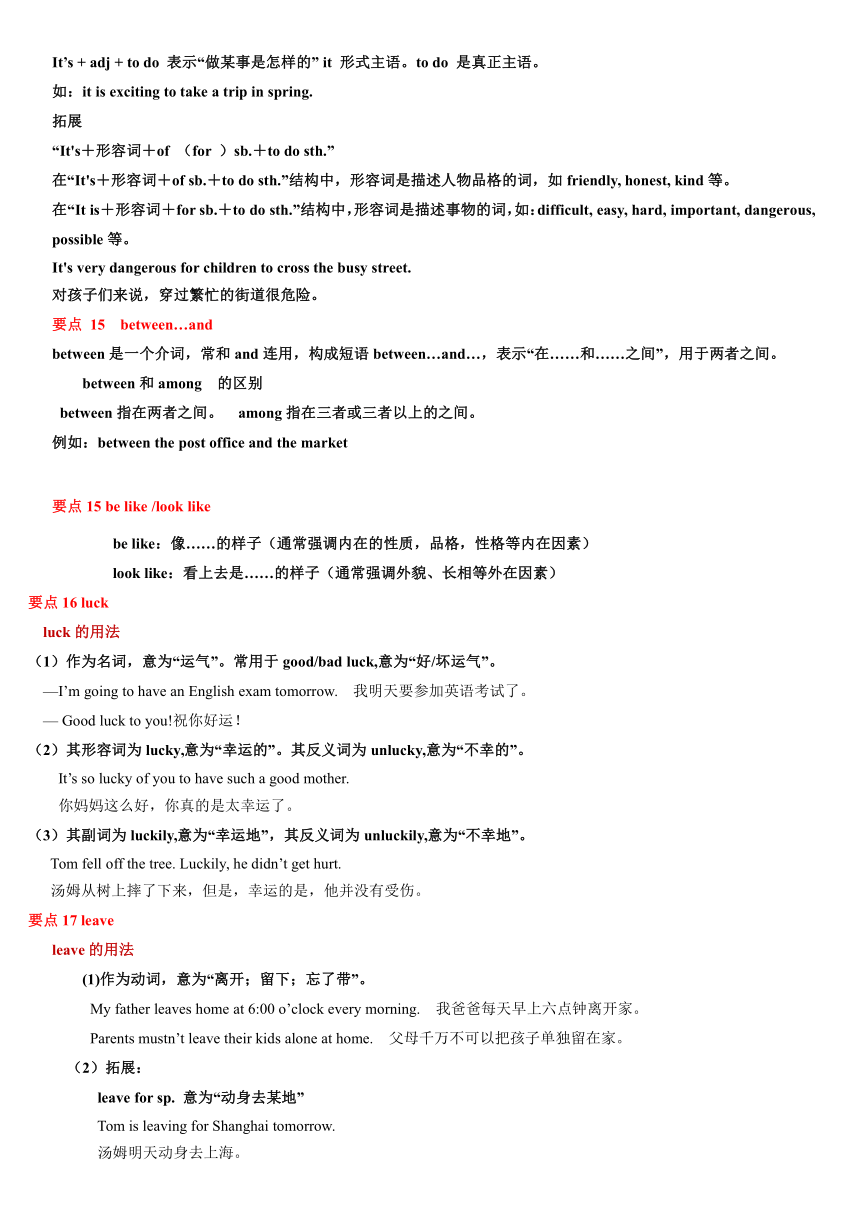
文档简介
七年级下册Unit 1-4一轮复习讲练
一、精讲精练
要点1 play
play可以用作及物动词,意为“打,踢,拉,弹(乐器)”。如:
Can you play football 你会踢足球吗?
注意:
play和球类名词连用时,名词前不加任何冠词,但用在乐器名词前应加定冠词the。
例如:She can play the piano. 她会弹钢琴。
拓展:
1)play还用作不及物动词,意为“玩”。“play with sth.”意为“玩……”。
Let’s play together! 让我们一起玩吧!
Don’t play with fire. 别玩火!
2)play用作名词,意为“戏剧”。
I like watching TV plays. 我喜欢看电视剧。
要点2
be good at擅长
介词at表示“在某方面”,其后可接名词、代词或动名词形式,其同义词组为do well in。
be good with 善于应付....的,灵巧的
be good at, be good for, be good to 与be good with
be good at “擅长.....”,后跟名词、代词或动名词,同义词组为 do well in
be good for 对“有.....好处”,反义词组为be bad for
be good to 对……好
be good with 善于应付....的,灵巧的
He is good at playing basketball.他擅长打篮球。
Vegetables are good for us.蔬菜对我们有益。
Our teachers are very good to us.我们的老师对我们很好。
She is good with children她对孩子很有一套。
要点3 talk
talk的用法
talk意为“谈话”,当talk作此意讲时,不强调内容,一般指说的动作,其后常接介词to和with,表示“与……谈话”;接介词about时表示“谈论……”。
例如:Jimmy and Bill often talk about computer games. 吉姆和比尔经常谈论电脑游戏。
拓展:speak、say和tell
speak一词强调说话的能力、对象和方式。用作及物动词时后接表示语言的名词作宾语;用作不及物动词时,后接介词to,表示“与……讲话”,一般用于打电话用语中或较正式的情况下。
例如:They can speak Chinese. 他们会说中文。
May I speak to Mr. Black 请问,我能和布莱克先生讲话吗?
say用作及物动词,强调说的内容。若指“对某人说”用say to sb.来表示。
例如:Can you say it in English 你能用英语说它吗?
I couldn’t think of anything to say to him. 我想不出有什么话要对他说。
3) tell经常作及物动词,意为“讲述,告诉”,后常接双宾语,侧重把一件事情传达给别人。常用结构是tell sb. to do sth. 意为“告诉某人做某事”,其否定形式为tell sb. not to do sth.,意为“告诉某人不要做某事”,tell sb. about sth. 意为“告诉某人关于某事”。
例如:My mother tells me to get up early. 我妈妈告诉我早点起床。
要点4 also , too , either. (也)
also, too, as well与either的区别
【思维导图】
要点5 help
help为动词,意为“帮助”,常用的句式有:
help sb (to) do sth帮助某人做某事
help sb with sth在某方面帮助某人
例如:
Mr. Li often helps us with our English. 李老师经常帮我们学习英语。
拓展:
help也可作名词,意为“帮助”,常用结构“with one’s help/with the help of…”意为“在的帮助下”。
help yourself/yourselves to...“请随便吃/喝……”。
Help yourselves to some apples,boys and girls. 孩子们,请随便吃苹果。
要点6 either...or...的用法
either...or...是固定搭配,意为“要么……要么……;或者……或者……”,用来连接两个独立的单词、短语或句子。此处either用作连词,意为“或者”。
When the girl is happy, she either sings or dances.那个女孩高兴时,不是唱就是跳。
【注意】
either...or...连接并列主语时,谓语动词应与最近的一个主语在人称和数上保持一致,这就是我们常说的“就近原则”。
Either you or I am going there tomorrow.明天要么你去那里,要么我去那里。
要点7 join
join的用法
(1)作为及物动词,意为“参加;加入”。其后常接club【俱乐部】,army【军队】,the Party【党】等词汇,指加入某一组织、团体等并成为其成员、会员。也常用于join sb.in (doing) sth.,意为“与某人一起做某事”。
My elder brother joined the army last year. 我哥哥去年当兵了。
Would you please join us in getting ready for dinner party
能够请你和我们一起为晚宴做准备工作吗?
(2)作为不及物动词,意为“参加”,常用于join in + 活动/游戏等。
May I join in the game with you 我可以和你们一起参加这个游戏吗?
辨析:take part in & join & join in
take part in 意为“参加,参与”,指参加某种活动并在其中起作用。 Have you ever taken part in any English competitions 你曾经参加过英语比赛吗?
join 意为“参加;加入”,指参加党、团组织、军队或人群等并成为其中一员。 My elder brother joined the army last year. 我哥哥去年参军了。
join in 意为“参加”,其后接活动,join in多指参加小规模的活动如“球赛、游戏”等,常用于日常口语. The young man joined in the game at last. 年青人最后也加入到比赛中。
要点8
lots of意为“许多;大量”
lots of相当于a lot of。其后既可以跟复数名词,也可以跟不可数名词。
当其后跟复数名词时,可与many互换;
其后跟不可数名词时,可与much互换。
We’ve got lots of apples. ( =We’ve got many apples. )
We've got lots of tea. (=We've got much tea. )
要点 9 afraid
afraid的用法
作为形容词,意为“害怕的;担心的”。常用于以下表达中:
①be afraid of sb./sth. “害怕某人/物”
②be afraid to do sth. “(因为害怕而)不敢做某事;害怕做某事”
③be afraid of doing sth. “害怕做某事”
I'm afraid (that)…意为“恐怕……”,表示一种委婉的语气,常用于礼貌地拒绝别人。其中afraid为形容词,意为“担心的;害怕的”,常作表语。例如:
10.how疑问副词,意为“如何;怎样”,此处用以询向交通方式。how对交通方式提问时,它的
要点 10 by+交通工具
Every day, I go to school by school bus.
① “by+表示交通工具的单数名词”,且之间不能有冠词,意为“乘坐(交通工具)”。
如: by underground 乘地铁;by train 乘火车;
② go to ... by ...=take / ride ... to ...
如:go to the library by bike = ride a bike to the library
go to school by bus = take a bus to school
要点 11 reach
arrive v.到达;抵达
They arrived at the school before the bell rang.在铃响之前他们到达了学校。
辨析reach, arrive和get
(1)arrive不及物动词,后接宾语时要加介词in(大地点)或at(小地点)。
(2)reach及物动词,后面可以直接加宾语。
get作“到达”讲,后接宾语时要加介词to。
注意:当arrive, get后接表示地点的副词,如here, there, home等时,则不用介词,即arrive/get+地点副词。
词语 大地点 小地点 其他副词
arrive +in +at arrive here, arrive there, arrive home
reach reach +地点 reach here, reach there, reach home
get get to+地点 get here, get there, get home
要点12 drive
drive的用法
(1)作为及物动词,意为“驾驶;驾车;用车送”。
My father drives his car to work every day.
我爸爸每天开车去上班。
(2)drive用作动词时,还可意为“驱逐,驱赶,逼迫”。
Please drive the dog out. 请把狗赶出去。
(3)作为不及物动词,意为“开车;驾车”,常用于drive to sp.,意为“开车去某地”,当其后接地点副词home, here, there等时,要省略介词to。
My mother drives home at 5:00 o’clock every afternoon.
我妈妈每天下午五点钟开车回家。
要点13 stop
stop的用法
(1)stop doing sth.表示“停止做某事”,doing是stop的宾语,是要停止的动作。
(2)stop to do 表示“停下来开始做某事”, to do是stop的状语,表示目的,是要开始做的事情。
(3)stop …from 表示阻止。。。做某事
要点14 It’s + adj + to do
It’s + adj + to do 表示“做某事是怎样的” it 形式主语。to do 是真正主语。
如:it is exciting to take a trip in spring.
拓展
“It's+形容词+of (for )sb.+to do sth.”
在“It's+形容词+of sb.+to do sth.”结构中,形容词是描述人物品格的词,如friendly, honest, kind等。
在“It is+形容词+for sb.+to do sth.”结构中,形容词是描述事物的词,如:difficult, easy, hard, important, dangerous, possible等。
It's very dangerous for children to cross the busy street.
对孩子们来说,穿过繁忙的街道很危险。
要点 15 between…and
between是一个介词,常和and连用,构成短语between…and…,表示“在……和……之间”,用于两者之间。
between和among 的区别
between指在两者之间。 among指在三者或三者以上的之间。
例如:between the post office and the market
要点15 be like /look like
be like:像……的样子(通常强调内在的性质,品格,性格等内在因素)
look like:看上去是……的样子(通常强调外貌、长相等外在因素)
要点16 luck
luck的用法
(1)作为名词,意为“运气”。常用于good/bad luck,意为“好/坏运气”。
—I’m going to have an English exam tomorrow. 我明天要参加英语考试了。
— Good luck to you!祝你好运!
(2)其形容词为lucky,意为“幸运的”。其反义词为unlucky,意为“不幸的”。
It’s so lucky of you to have such a good mother.
你妈妈这么好,你真的是太幸运了。
(3)其副词为luckily,意为“幸运地”,其反义词为unluckily,意为“不幸地”。
Tom fell off the tree. Luckily, he didn’t get hurt.
汤姆从树上摔了下来,但是,幸运的是,他并没有受伤。
要点17 leave
leave的用法
(1)作为动词,意为“离开;留下;忘了带”。
My father leaves home at 6:00 o’clock every morning. 我爸爸每天早上六点钟离开家。
Parents mustn’t leave their kids alone at home. 父母千万不可以把孩子单独留在家。
(2)拓展:
leave for sp. 意为“动身去某地”
Tom is leaving for Shanghai tomorrow.
汤姆明天动身去上海。
(3)注意:leave...是“离开……”的意思,而leave for...是“动身去……”的意思。
Today we’ll leave Changsha and tomorrow we’ll leave for Beijing.
今天我们将离开长沙,明天我们将动身去北京。
18.cross v. 横过;越过
v. 意为“穿越,越过;(表面上)横过;渡过”
cross a/the road 横穿道路 cross the sea/mountain 越过大海/翻越高山
The bridge crosses the river. 这座桥横跨这条河。
They crossed the finishing line together. 他们同时越过终点线。
v. 意为“使交叉;使交叠”
cross your arms/ legs 交叉两臂/双腿
【拓展】
n. 意为“叉字形,十字形记号;十字架”
I put a cross on the map to show where the hotel is. 我在地图上打了个叉标出了旅馆的位置。
【词义辨析】cross & across & crossing & through
① across adv./prep. 意为“穿过;越过”,强调动作在物体表面越过。
cross = go across
They help the students go across the river. = They help the students cross the river. 他们帮学生过河。
② crossing n.十字路口
要点19 practice
practise 后可跟名词、代词和动词的-ing 形式,不能接不定式。practise的基本意思是“练习”、“训练”。
practise和 practice,在英国英语中,两者分别是动词和名词;但在美国英语中,没有区分,都可以是动词或名词,两词发音一样,作名词时作“练习”讲一般为不可数名词。
【思维导图】
要点20 Remember
比较remember和forget
remember/forget to do sth. 记得/忘记要做某事(未做)
remember/forget doing sth. 记得/忘记做过某事(已做)
例:I forgot to close the door when I left. 我离开的时候忘记关门了。(未做)
I remembered closing the door when I left. 我记得我离开的时候关门了。(做了)
情态动词can的用法
can意为“能,会”,是英语中最常见的几个情态动词之一。它没有人称和数的变化,不能单独作谓语,必须和不带to的动词原形一起构成谓语。其用法如下:
用法 例句
表示能力,意为“能;会” The little boy can sing well.这个小男孩歌唱得很好。
表示请求或许可,意为“可以” You can go to the park with your friends.你可以和你的朋友们一起去公园。(表示许可) Can I have some bread 我能吃些面包吗?(表示请求)
表示推测,意为“可能”,常用于否定句和疑问句 Tom can’t be at home.汤姆不可能在家里。 Can it be true 它可能是真的吗?
What time/When引导的特殊疑问句
①what time和when都可提问时间,意为“何时;什么时候”。
What time do you get up 你几点起床?
When does he do his homework 他何时做家庭作业?
②询问时间的句式结构有:(1)What time/When+助动词+主语+动词原形+其他?(2)What time/When+连系动词be+主语+其他?
回答时可以用in,on或at组成的表示时间的介词短语。
what time 询问某事发生的具体时刻
when 多询问某事发生的年份、月份、日期,也可询问时刻
—What time is it 几点了?
—It’s a quarter past ten.十点十五了。
中考英语一轮复习讲练测
一、单项选择
1. My father ________ buy a new watch ______ my birthday.
A. want to, for B. wants , for C. wants to, with D. wants to, for
【答案】D
【解析】主语是第三人称时,谓语用单数,即wants ; “想要做某事”want to do sth. ;buy sb. sth=" buy" sth. for sb. 综合可知,选D。
2 It's an English class. Please don't _________ Chinese.
A. say B. talk C. tell D. speak
【答案】D
【解析】本题考查表示“说、讲”的四个动词的辨析。speak强调说的动作,不强调所说的内容 ,作及物动词时,常以某种语言作宾语。talk“讲”、“说话”、“谈话”,一般用做不及物动词,指一般的谈话或交谈,须跟宾语时,与to、with、about等介词连用。say一般着重讲话的内容,指有连贯性的说话,通常用做及物动词。tell指把一件事情传达给别人或讲述一件事情、一个故事等,常用做及物动词。关键句意“请不要说汉语”可知用动词 speak,故选D。
3. Mom, I need you ________ me a notebook.
A. buy B. buying C. to buy D. to buying
【答案】C
【解析】本题考查need 后面跟动词不定式的用法,构成 need sb to do sth。need sb to do sth 是固定搭配,意为“需要某人做某事”,故选C。句意是:妈妈,我需要你给我买一个笔记本。
4. I want to find a new _____.
A. work B. works C. job D. jobs
【答案】C
【解析】句意:我想找一个新工作。job是可数名词,work是不可数名词。故选C.
5.— Do you often go to the sports center
— No, _________________. I don't like sports at all.
A. always B. sometimes C. never D. usually
【答案】C
【解析】考查副词辨析,注意识记never的用法。句意:——你经常去运动中心吗?——不,从不。我一点也不喜欢运动。always总是,sometimes有时候,usually通常,均表示肯定,never从不,表示否定,根据no可知是否定回答,故选C。
6. — _______________ do you have dinner
— At 6:00 p. m. after I get home.
A. What time B. How long C. What day D. How old
【答案】A
【解析】考查疑问词辨析,首先识记其区别,然后根据答语关键词确定。句意:——你什么时间吃晚饭?——在我到家后晚上六点。A.什么时间,提问时间点;B.多长时间,提问for+时间段;C.什么日子;D.多大,提问年龄。根据答语At 6;00 p. m.可知是时间点,所以用what time,故选A。
7. I am busy ________ English in my room.
A. to read B. reading C. read D. reads
【答案】B
【解析】本题考查固定短语 be busy doing sth 的用法。be busy doing sth 是固定搭配,意为“忙于做某事”,故选B。句意是:我正在我的房间里忙着读英语。
8. Either you or your father _______ TV in the evening.
A. watch B. watches C. don't watch D. watchs
【答案】B
【解析】考查主谓一致中的就近一致原则。句意:要么是你,要么是你父亲在晚上看电视。either...or...连接两个词做主语动词应适用就近一致原则,your father为第三人称单数因此动词应是第三人称单数形式,以-ch、-sh、-x、-s结尾的动词的单数形式应加-es,故选B
9. In fact, _______ is hard for the police to keep order in an important football match.
A. this B. that C. there D. it
【答案】D
【解析】本题考查固定句型。it is+形容词+for sb to do sth. 固定句型。不定式短语作主语,it是形式主语,故选D。
10.For them,it's not easy ________ school every day.
A. Get B. get to C. to get to D. to get
【答案】C
【解析】考查动词不定式。句意:对于他们来说,每天到校是不容易的。it is +形容词+动词不定式,做某事是……,it代替动词不定式做形式主语。不定式做真正的主语,所以排除A,B,get to some place 表示到达某地,当地点为副词时,省略to,school是地点名词,所以to不可以省略。故答案为C。
11. When he arrived at the airport, Lee Minho found that ________ fans were waiting for him there.
A. hundred B. hundreds C. hundred of D. hundreds of
【答案】D
【解析】本题考查数词的表达法。hundred,thousand,million等数词不与具体数字连用,而是表示不确定的泛指数时,不仅要要用复数,而且要后接介词of,然后才能接名词;当这些词与具体数字连用时,习惯上用单数,而且也不后接介词of。根据句意“当他到达机场时,李敏镐发成百上千的名影迷都在那里等着他”可知选D。
12.—Hi, guys. Where were we yesterday
—We learned the differences fact and opinion.
A. between B. among C. during D. beyond
【答案】A
【解析】本题考查介词辨析。根据句子中的 difference可知是考查短语 the difference between…and…,意为“……和……之间的区别”,故选A。句意是:我们学习了事实和观点之间的区别。
13.A boat an help us ______________ the river.
A. swim B. cross C. go D. play
【答案】B
【解析】考查动词辨析,首先识记动词词义,然后根据关键词确定。句意:船可以帮助我们穿过河流。A.游泳;B.穿过;C.去;D.玩耍。river,河流,boat船,船帮助我们穿过河流,故选B。
14. It takes me about 15 minutes _____ there.
A. walk B. walk to C. to walk D. to walk to
【答案】C
【解析】考查固定搭配,注意it takes sb+时间段+to do的用法。句意: 到达那里大约需要15分钟。it takes sb+时间段+to do,固定搭配,做某事花费某人多久,故选C。
15. I have _______________ things to do today. but there isn't ______________ time
A. too many; too many B. too many; too much
C. too much; too much D. too much; too many
【答案】B
【解析】考查不定代词的使用。句意:我今天有太多的事情要做。但是时间不多了。too many太多,后接可数名词复数;too much太多,后接不可数名词。根据things,为可数名词复数,因此第一个空应为too many,排除C,D项;结合time为不可数名词,应使用too much来形容。故选B。
16.—Emma can go out ________ school nights but she must be back ________ ten o'clock.
—Oh, I see.
A. on, before B. on, after C. in, before D. in, after
【答案】A
【解析】考查介词辨析,注意识记固定搭配on school night的用法。句意:——在上学的晚上,艾玛可以出去,但是七点前必须回来。——哦,我明白了。on school night在上学的晚上,固定搭配,使用介词on,根据must be back可知是十点前必须回来,应使用before,故答案是A。
17. — Mom, may I go to the party with my friends tonight
— Yes, you_________________. But you ______________ be back by 10:00 p.m.
A. can; may B. must; have to C. may; must D. must: may
【答案】C
【解析】考查情态动词。句意:——妈妈,我今晚可以和朋友一起去参加聚会吗 ——可以,但你必须在晚上10点前回来。may可能;must必须(偏主观);have to不得不(偏客观)。根据问句中的may和答句中的Yes可知,肯定回答应使用may,结合句意,妈妈会要求必须10点前主动回家,因此使用must。故选C。
18. I don't like singing. My brother doesn't like singing, _____.
A. too B. also C. as well D. either
【答案】D
【解析】副词辨析。句意:我不喜欢唱歌。我哥哥也不喜欢唱歌。否定句句尾表示也应使用either,故选D。
19. _______ late. It's your first day to work.
A. Don't to be B. Don't be C. Don't D. No
【答案】B
【解析】本题考查表示固定的祈使句的用法。late 是形容词,前面需要和be动词连用,否定的祈使句以 Don't +动词原形开头,故选B。句意是:别迟到了,这是你第一天上班。
20. Mike doesn't get on well with his sister and he often ________ with her.
A. argues B. plays C. works D. talks
【答案】A
【解析】考查动词辨析,注意根据句意和语境选择正确的动词。句意:Mike和他妹妹相处的不好,并且他经常和她争吵。A、争吵;B、玩;C、工作;D、谈论。由Mike doesn't get on well with his sister可知这里说的是“他经常和妹妹争吵”,争吵,argue,故选A。
二、词形变化
1.Tara wants to join the music club . She is good at ______ (sing).
2.Tom’s father is an artist and he spends most of his time _____ (draw ) pictures.
3.I want to learn _____ (swim) for two months so that I can enjoy the cool sea water this summer holiday .
4. Peter’s mother is a great ______ (music).
5. Please ______ (come) and watch our soccer game.
6.He ________(watch)TV after he_______ (get) home .
7.After the heavy rain , the sky became much ______ (clean )
8.Gina often does ______ (she) homework after school.
9. Today is __________(woman)Day. My mum __________(wear)a new dress to celebrate
10.The students have to have meals in the________ (dine) hall in our school.
【答案】1.singing 2.drawing 3.to swim 4.musican 5.come 6.watched got 7.cleaner 8.her 9.Women’s wears 10.dining
三、单词拼写。
1.As the old saying goes , “Actions s_______ louder than words.”
2.I can s______ very well and I want to be a singer in the future.
3.We will go to the old people’s home this afternoon . Do you want to j______ us
4.You can’t s______ in the river . It’s dangerous .
5. My friend always takes a w________ with his mother in the evening .
6. Joe was playing with a dog when I walked p_______ his small house .
7. Teachers find that one q______ of the students feel sleepy in class in spring .
8.Are you a___________ of being alone at night
9.Don't c__________ the road when the light is red.
10.Don't l____________ your books here. The room will be closed soon.
11.I hope my dream can come t__________ one day.
12.How long does it t___________ you to get to the library
13.The bus r___________ is not so boring because we can talk about many things there.
14.-Do you have family r________
-Yes, I must brush my shoes and I have to run for half an hour every day.
15.Never f________ with your classmates at school, John.
【答案】1.speak 2.sing 3.join 4.swim 5.walk 6.pass 7.quarter 8.afraid 9.cross 10.leave 11.true 12.take 13.ride 14.rules 15.fight
四、根据对话内容,运用方框中所给的句子选项补全对话(选项中有一项是多余的)
A:Good morning , Bill. Nice to see you.
B:Good morning , Anna . 1. ____________
A:There’re many new clubs in our school this term. 2. __________
B: I want to join the baseball club .
A: 3. ___________
B: Yes, I can play it very well. Do you like to play baseball , Anna
A: No, I don’t like it at all. I think it’s difficult .
B: 4. ___________
A: I like to play the guitar , but I can’t play it very well.
B: 5. __________ The teachers there can help you with it .
A: Sounds good . I’ll think about it .
Can you play baseball I think you can join the guitar club . How are you Nice to see you , too. What do you like to do What club do you want to join
【答案】DFAEB
A: Hello, Nina! 1________________ .
B: Hi, Martin. Thanks for saying so. That's because I go to school in my father's car this morning.
A: How do you usually go to school
B: I ride my bike.
A: 2____________________ .
B: It's four kilometers.
A: I see. How long does it take you to ride here
B: 3______________________.
A:4_______________________ .
B: Oh, only five minutes.
A: So fast. It usually takes me ten minutes to get to school.
B: Ten minutes 5__________________.
A: I walk. My house is near here.
A. It takes me half an hour. B. Is that your new bike C. You come to school so early today. D. How do you go to school E. How far is it from your home to school F. I love my father very much. G. How long does it take your father to drive here
五、完成句子
1. 我想和你们交朋友。
I want _________ _________ _________ _________ you.
2. 孩子们喜欢和他玩游戏。
Children like _________ _________ ______ with him.
3. 他经常帮我学英语。
He often ________ _________ _________ English.
4. 你善于和那些学生打交道吗
Are you ___________ __________ those students
5.我们需要你教我们英语。
We ______ ______ ______ ______ us English.
6.要么你,要么迈克给我们讲英语故事。
__________ you ________Mike________ English stories for us.
7.我们的班主任对我们要求很严。
Our head-teacher is really ________ ________ us.
8.不要和其他男孩打架。
________ _________ ___________ other boys.
9.亨利睡前不得不做什么呢
________ ________Henry________ ________ ________before sleep
10.对我们来说,独自在河里游泳是危险的。
It’s __________ for us __________ ___________alone in the river.
【答案】1.to make friends with 2.playing a game 3.helps me with/study 4. good with 5.need you to teach
6.Either or tells 7.strict with 8.Don’t fight with 9.What does have to do 10.dangerous to swim
六、语法填空
Today I bought a copy of China Daily. This is the 1.________ (one) time I have bought an English language newspaper. I know I can only understand a little part of it. I bought the copy simply out of curiosity(好奇心). My teacher 2.________ (tell) me it's a good reading material for 3.________(learn) English. It is also 4.________ (help) even for those who learn other foreign languages, 5.________ French and German. I haven't got into the details of each piece. I have just 6.________ (look) through the headlines. I find 7.________ very interesting. There are many pictures and a weather report. It has many sections, such as Home News, International News, Business News and Sports News. Certainly, there 8.________ (be) some other sections, too. I like anything from sports and entertainment to politics. I plan to buy it often. In this way I can get a great deal of 9.________ (information) and important news 10.________ I'm learning English.
【答案】1.first 2.told 3.learning 4.helpful 5.like 6.looked 7.it 8.are 9.information 10.while/when
一、精讲精练
要点1 play
play可以用作及物动词,意为“打,踢,拉,弹(乐器)”。如:
Can you play football 你会踢足球吗?
注意:
play和球类名词连用时,名词前不加任何冠词,但用在乐器名词前应加定冠词the。
例如:She can play the piano. 她会弹钢琴。
拓展:
1)play还用作不及物动词,意为“玩”。“play with sth.”意为“玩……”。
Let’s play together! 让我们一起玩吧!
Don’t play with fire. 别玩火!
2)play用作名词,意为“戏剧”。
I like watching TV plays. 我喜欢看电视剧。
要点2
be good at擅长
介词at表示“在某方面”,其后可接名词、代词或动名词形式,其同义词组为do well in。
be good with 善于应付....的,灵巧的
be good at, be good for, be good to 与be good with
be good at “擅长.....”,后跟名词、代词或动名词,同义词组为 do well in
be good for 对“有.....好处”,反义词组为be bad for
be good to 对……好
be good with 善于应付....的,灵巧的
He is good at playing basketball.他擅长打篮球。
Vegetables are good for us.蔬菜对我们有益。
Our teachers are very good to us.我们的老师对我们很好。
She is good with children她对孩子很有一套。
要点3 talk
talk的用法
talk意为“谈话”,当talk作此意讲时,不强调内容,一般指说的动作,其后常接介词to和with,表示“与……谈话”;接介词about时表示“谈论……”。
例如:Jimmy and Bill often talk about computer games. 吉姆和比尔经常谈论电脑游戏。
拓展:speak、say和tell
speak一词强调说话的能力、对象和方式。用作及物动词时后接表示语言的名词作宾语;用作不及物动词时,后接介词to,表示“与……讲话”,一般用于打电话用语中或较正式的情况下。
例如:They can speak Chinese. 他们会说中文。
May I speak to Mr. Black 请问,我能和布莱克先生讲话吗?
say用作及物动词,强调说的内容。若指“对某人说”用say to sb.来表示。
例如:Can you say it in English 你能用英语说它吗?
I couldn’t think of anything to say to him. 我想不出有什么话要对他说。
3) tell经常作及物动词,意为“讲述,告诉”,后常接双宾语,侧重把一件事情传达给别人。常用结构是tell sb. to do sth. 意为“告诉某人做某事”,其否定形式为tell sb. not to do sth.,意为“告诉某人不要做某事”,tell sb. about sth. 意为“告诉某人关于某事”。
例如:My mother tells me to get up early. 我妈妈告诉我早点起床。
要点4 also , too , either. (也)
also, too, as well与either的区别
【思维导图】
要点5 help
help为动词,意为“帮助”,常用的句式有:
help sb (to) do sth帮助某人做某事
help sb with sth在某方面帮助某人
例如:
Mr. Li often helps us with our English. 李老师经常帮我们学习英语。
拓展:
help也可作名词,意为“帮助”,常用结构“with one’s help/with the help of…”意为“在的帮助下”。
help yourself/yourselves to...“请随便吃/喝……”。
Help yourselves to some apples,boys and girls. 孩子们,请随便吃苹果。
要点6 either...or...的用法
either...or...是固定搭配,意为“要么……要么……;或者……或者……”,用来连接两个独立的单词、短语或句子。此处either用作连词,意为“或者”。
When the girl is happy, she either sings or dances.那个女孩高兴时,不是唱就是跳。
【注意】
either...or...连接并列主语时,谓语动词应与最近的一个主语在人称和数上保持一致,这就是我们常说的“就近原则”。
Either you or I am going there tomorrow.明天要么你去那里,要么我去那里。
要点7 join
join的用法
(1)作为及物动词,意为“参加;加入”。其后常接club【俱乐部】,army【军队】,the Party【党】等词汇,指加入某一组织、团体等并成为其成员、会员。也常用于join sb.in (doing) sth.,意为“与某人一起做某事”。
My elder brother joined the army last year. 我哥哥去年当兵了。
Would you please join us in getting ready for dinner party
能够请你和我们一起为晚宴做准备工作吗?
(2)作为不及物动词,意为“参加”,常用于join in + 活动/游戏等。
May I join in the game with you 我可以和你们一起参加这个游戏吗?
辨析:take part in & join & join in
take part in 意为“参加,参与”,指参加某种活动并在其中起作用。 Have you ever taken part in any English competitions 你曾经参加过英语比赛吗?
join 意为“参加;加入”,指参加党、团组织、军队或人群等并成为其中一员。 My elder brother joined the army last year. 我哥哥去年参军了。
join in 意为“参加”,其后接活动,join in多指参加小规模的活动如“球赛、游戏”等,常用于日常口语. The young man joined in the game at last. 年青人最后也加入到比赛中。
要点8
lots of意为“许多;大量”
lots of相当于a lot of。其后既可以跟复数名词,也可以跟不可数名词。
当其后跟复数名词时,可与many互换;
其后跟不可数名词时,可与much互换。
We’ve got lots of apples. ( =We’ve got many apples. )
We've got lots of tea. (=We've got much tea. )
要点 9 afraid
afraid的用法
作为形容词,意为“害怕的;担心的”。常用于以下表达中:
①be afraid of sb./sth. “害怕某人/物”
②be afraid to do sth. “(因为害怕而)不敢做某事;害怕做某事”
③be afraid of doing sth. “害怕做某事”
I'm afraid (that)…意为“恐怕……”,表示一种委婉的语气,常用于礼貌地拒绝别人。其中afraid为形容词,意为“担心的;害怕的”,常作表语。例如:
10.how疑问副词,意为“如何;怎样”,此处用以询向交通方式。how对交通方式提问时,它的
要点 10 by+交通工具
Every day, I go to school by school bus.
① “by+表示交通工具的单数名词”,且之间不能有冠词,意为“乘坐(交通工具)”。
如: by underground 乘地铁;by train 乘火车;
② go to ... by ...=take / ride ... to ...
如:go to the library by bike = ride a bike to the library
go to school by bus = take a bus to school
要点 11 reach
arrive v.到达;抵达
They arrived at the school before the bell rang.在铃响之前他们到达了学校。
辨析reach, arrive和get
(1)arrive不及物动词,后接宾语时要加介词in(大地点)或at(小地点)。
(2)reach及物动词,后面可以直接加宾语。
get作“到达”讲,后接宾语时要加介词to。
注意:当arrive, get后接表示地点的副词,如here, there, home等时,则不用介词,即arrive/get+地点副词。
词语 大地点 小地点 其他副词
arrive +in +at arrive here, arrive there, arrive home
reach reach +地点 reach here, reach there, reach home
get get to+地点 get here, get there, get home
要点12 drive
drive的用法
(1)作为及物动词,意为“驾驶;驾车;用车送”。
My father drives his car to work every day.
我爸爸每天开车去上班。
(2)drive用作动词时,还可意为“驱逐,驱赶,逼迫”。
Please drive the dog out. 请把狗赶出去。
(3)作为不及物动词,意为“开车;驾车”,常用于drive to sp.,意为“开车去某地”,当其后接地点副词home, here, there等时,要省略介词to。
My mother drives home at 5:00 o’clock every afternoon.
我妈妈每天下午五点钟开车回家。
要点13 stop
stop的用法
(1)stop doing sth.表示“停止做某事”,doing是stop的宾语,是要停止的动作。
(2)stop to do 表示“停下来开始做某事”, to do是stop的状语,表示目的,是要开始做的事情。
(3)stop …from 表示阻止。。。做某事
要点14 It’s + adj + to do
It’s + adj + to do 表示“做某事是怎样的” it 形式主语。to do 是真正主语。
如:it is exciting to take a trip in spring.
拓展
“It's+形容词+of (for )sb.+to do sth.”
在“It's+形容词+of sb.+to do sth.”结构中,形容词是描述人物品格的词,如friendly, honest, kind等。
在“It is+形容词+for sb.+to do sth.”结构中,形容词是描述事物的词,如:difficult, easy, hard, important, dangerous, possible等。
It's very dangerous for children to cross the busy street.
对孩子们来说,穿过繁忙的街道很危险。
要点 15 between…and
between是一个介词,常和and连用,构成短语between…and…,表示“在……和……之间”,用于两者之间。
between和among 的区别
between指在两者之间。 among指在三者或三者以上的之间。
例如:between the post office and the market
要点15 be like /look like
be like:像……的样子(通常强调内在的性质,品格,性格等内在因素)
look like:看上去是……的样子(通常强调外貌、长相等外在因素)
要点16 luck
luck的用法
(1)作为名词,意为“运气”。常用于good/bad luck,意为“好/坏运气”。
—I’m going to have an English exam tomorrow. 我明天要参加英语考试了。
— Good luck to you!祝你好运!
(2)其形容词为lucky,意为“幸运的”。其反义词为unlucky,意为“不幸的”。
It’s so lucky of you to have such a good mother.
你妈妈这么好,你真的是太幸运了。
(3)其副词为luckily,意为“幸运地”,其反义词为unluckily,意为“不幸地”。
Tom fell off the tree. Luckily, he didn’t get hurt.
汤姆从树上摔了下来,但是,幸运的是,他并没有受伤。
要点17 leave
leave的用法
(1)作为动词,意为“离开;留下;忘了带”。
My father leaves home at 6:00 o’clock every morning. 我爸爸每天早上六点钟离开家。
Parents mustn’t leave their kids alone at home. 父母千万不可以把孩子单独留在家。
(2)拓展:
leave for sp. 意为“动身去某地”
Tom is leaving for Shanghai tomorrow.
汤姆明天动身去上海。
(3)注意:leave...是“离开……”的意思,而leave for...是“动身去……”的意思。
Today we’ll leave Changsha and tomorrow we’ll leave for Beijing.
今天我们将离开长沙,明天我们将动身去北京。
18.cross v. 横过;越过
v. 意为“穿越,越过;(表面上)横过;渡过”
cross a/the road 横穿道路 cross the sea/mountain 越过大海/翻越高山
The bridge crosses the river. 这座桥横跨这条河。
They crossed the finishing line together. 他们同时越过终点线。
v. 意为“使交叉;使交叠”
cross your arms/ legs 交叉两臂/双腿
【拓展】
n. 意为“叉字形,十字形记号;十字架”
I put a cross on the map to show where the hotel is. 我在地图上打了个叉标出了旅馆的位置。
【词义辨析】cross & across & crossing & through
① across adv./prep. 意为“穿过;越过”,强调动作在物体表面越过。
cross = go across
They help the students go across the river. = They help the students cross the river. 他们帮学生过河。
② crossing n.十字路口
要点19 practice
practise 后可跟名词、代词和动词的-ing 形式,不能接不定式。practise的基本意思是“练习”、“训练”。
practise和 practice,在英国英语中,两者分别是动词和名词;但在美国英语中,没有区分,都可以是动词或名词,两词发音一样,作名词时作“练习”讲一般为不可数名词。
【思维导图】
要点20 Remember
比较remember和forget
remember/forget to do sth. 记得/忘记要做某事(未做)
remember/forget doing sth. 记得/忘记做过某事(已做)
例:I forgot to close the door when I left. 我离开的时候忘记关门了。(未做)
I remembered closing the door when I left. 我记得我离开的时候关门了。(做了)
情态动词can的用法
can意为“能,会”,是英语中最常见的几个情态动词之一。它没有人称和数的变化,不能单独作谓语,必须和不带to的动词原形一起构成谓语。其用法如下:
用法 例句
表示能力,意为“能;会” The little boy can sing well.这个小男孩歌唱得很好。
表示请求或许可,意为“可以” You can go to the park with your friends.你可以和你的朋友们一起去公园。(表示许可) Can I have some bread 我能吃些面包吗?(表示请求)
表示推测,意为“可能”,常用于否定句和疑问句 Tom can’t be at home.汤姆不可能在家里。 Can it be true 它可能是真的吗?
What time/When引导的特殊疑问句
①what time和when都可提问时间,意为“何时;什么时候”。
What time do you get up 你几点起床?
When does he do his homework 他何时做家庭作业?
②询问时间的句式结构有:(1)What time/When+助动词+主语+动词原形+其他?(2)What time/When+连系动词be+主语+其他?
回答时可以用in,on或at组成的表示时间的介词短语。
what time 询问某事发生的具体时刻
when 多询问某事发生的年份、月份、日期,也可询问时刻
—What time is it 几点了?
—It’s a quarter past ten.十点十五了。
中考英语一轮复习讲练测
一、单项选择
1. My father ________ buy a new watch ______ my birthday.
A. want to, for B. wants , for C. wants to, with D. wants to, for
【答案】D
【解析】主语是第三人称时,谓语用单数,即wants ; “想要做某事”want to do sth. ;buy sb. sth=" buy" sth. for sb. 综合可知,选D。
2 It's an English class. Please don't _________ Chinese.
A. say B. talk C. tell D. speak
【答案】D
【解析】本题考查表示“说、讲”的四个动词的辨析。speak强调说的动作,不强调所说的内容 ,作及物动词时,常以某种语言作宾语。talk“讲”、“说话”、“谈话”,一般用做不及物动词,指一般的谈话或交谈,须跟宾语时,与to、with、about等介词连用。say一般着重讲话的内容,指有连贯性的说话,通常用做及物动词。tell指把一件事情传达给别人或讲述一件事情、一个故事等,常用做及物动词。关键句意“请不要说汉语”可知用动词 speak,故选D。
3. Mom, I need you ________ me a notebook.
A. buy B. buying C. to buy D. to buying
【答案】C
【解析】本题考查need 后面跟动词不定式的用法,构成 need sb to do sth。need sb to do sth 是固定搭配,意为“需要某人做某事”,故选C。句意是:妈妈,我需要你给我买一个笔记本。
4. I want to find a new _____.
A. work B. works C. job D. jobs
【答案】C
【解析】句意:我想找一个新工作。job是可数名词,work是不可数名词。故选C.
5.— Do you often go to the sports center
— No, _________________. I don't like sports at all.
A. always B. sometimes C. never D. usually
【答案】C
【解析】考查副词辨析,注意识记never的用法。句意:——你经常去运动中心吗?——不,从不。我一点也不喜欢运动。always总是,sometimes有时候,usually通常,均表示肯定,never从不,表示否定,根据no可知是否定回答,故选C。
6. — _______________ do you have dinner
— At 6:00 p. m. after I get home.
A. What time B. How long C. What day D. How old
【答案】A
【解析】考查疑问词辨析,首先识记其区别,然后根据答语关键词确定。句意:——你什么时间吃晚饭?——在我到家后晚上六点。A.什么时间,提问时间点;B.多长时间,提问for+时间段;C.什么日子;D.多大,提问年龄。根据答语At 6;00 p. m.可知是时间点,所以用what time,故选A。
7. I am busy ________ English in my room.
A. to read B. reading C. read D. reads
【答案】B
【解析】本题考查固定短语 be busy doing sth 的用法。be busy doing sth 是固定搭配,意为“忙于做某事”,故选B。句意是:我正在我的房间里忙着读英语。
8. Either you or your father _______ TV in the evening.
A. watch B. watches C. don't watch D. watchs
【答案】B
【解析】考查主谓一致中的就近一致原则。句意:要么是你,要么是你父亲在晚上看电视。either...or...连接两个词做主语动词应适用就近一致原则,your father为第三人称单数因此动词应是第三人称单数形式,以-ch、-sh、-x、-s结尾的动词的单数形式应加-es,故选B
9. In fact, _______ is hard for the police to keep order in an important football match.
A. this B. that C. there D. it
【答案】D
【解析】本题考查固定句型。it is+形容词+for sb to do sth. 固定句型。不定式短语作主语,it是形式主语,故选D。
10.For them,it's not easy ________ school every day.
A. Get B. get to C. to get to D. to get
【答案】C
【解析】考查动词不定式。句意:对于他们来说,每天到校是不容易的。it is +形容词+动词不定式,做某事是……,it代替动词不定式做形式主语。不定式做真正的主语,所以排除A,B,get to some place 表示到达某地,当地点为副词时,省略to,school是地点名词,所以to不可以省略。故答案为C。
11. When he arrived at the airport, Lee Minho found that ________ fans were waiting for him there.
A. hundred B. hundreds C. hundred of D. hundreds of
【答案】D
【解析】本题考查数词的表达法。hundred,thousand,million等数词不与具体数字连用,而是表示不确定的泛指数时,不仅要要用复数,而且要后接介词of,然后才能接名词;当这些词与具体数字连用时,习惯上用单数,而且也不后接介词of。根据句意“当他到达机场时,李敏镐发成百上千的名影迷都在那里等着他”可知选D。
12.—Hi, guys. Where were we yesterday
—We learned the differences fact and opinion.
A. between B. among C. during D. beyond
【答案】A
【解析】本题考查介词辨析。根据句子中的 difference可知是考查短语 the difference between…and…,意为“……和……之间的区别”,故选A。句意是:我们学习了事实和观点之间的区别。
13.A boat an help us ______________ the river.
A. swim B. cross C. go D. play
【答案】B
【解析】考查动词辨析,首先识记动词词义,然后根据关键词确定。句意:船可以帮助我们穿过河流。A.游泳;B.穿过;C.去;D.玩耍。river,河流,boat船,船帮助我们穿过河流,故选B。
14. It takes me about 15 minutes _____ there.
A. walk B. walk to C. to walk D. to walk to
【答案】C
【解析】考查固定搭配,注意it takes sb+时间段+to do的用法。句意: 到达那里大约需要15分钟。it takes sb+时间段+to do,固定搭配,做某事花费某人多久,故选C。
15. I have _______________ things to do today. but there isn't ______________ time
A. too many; too many B. too many; too much
C. too much; too much D. too much; too many
【答案】B
【解析】考查不定代词的使用。句意:我今天有太多的事情要做。但是时间不多了。too many太多,后接可数名词复数;too much太多,后接不可数名词。根据things,为可数名词复数,因此第一个空应为too many,排除C,D项;结合time为不可数名词,应使用too much来形容。故选B。
16.—Emma can go out ________ school nights but she must be back ________ ten o'clock.
—Oh, I see.
A. on, before B. on, after C. in, before D. in, after
【答案】A
【解析】考查介词辨析,注意识记固定搭配on school night的用法。句意:——在上学的晚上,艾玛可以出去,但是七点前必须回来。——哦,我明白了。on school night在上学的晚上,固定搭配,使用介词on,根据must be back可知是十点前必须回来,应使用before,故答案是A。
17. — Mom, may I go to the party with my friends tonight
— Yes, you_________________. But you ______________ be back by 10:00 p.m.
A. can; may B. must; have to C. may; must D. must: may
【答案】C
【解析】考查情态动词。句意:——妈妈,我今晚可以和朋友一起去参加聚会吗 ——可以,但你必须在晚上10点前回来。may可能;must必须(偏主观);have to不得不(偏客观)。根据问句中的may和答句中的Yes可知,肯定回答应使用may,结合句意,妈妈会要求必须10点前主动回家,因此使用must。故选C。
18. I don't like singing. My brother doesn't like singing, _____.
A. too B. also C. as well D. either
【答案】D
【解析】副词辨析。句意:我不喜欢唱歌。我哥哥也不喜欢唱歌。否定句句尾表示也应使用either,故选D。
19. _______ late. It's your first day to work.
A. Don't to be B. Don't be C. Don't D. No
【答案】B
【解析】本题考查表示固定的祈使句的用法。late 是形容词,前面需要和be动词连用,否定的祈使句以 Don't +动词原形开头,故选B。句意是:别迟到了,这是你第一天上班。
20. Mike doesn't get on well with his sister and he often ________ with her.
A. argues B. plays C. works D. talks
【答案】A
【解析】考查动词辨析,注意根据句意和语境选择正确的动词。句意:Mike和他妹妹相处的不好,并且他经常和她争吵。A、争吵;B、玩;C、工作;D、谈论。由Mike doesn't get on well with his sister可知这里说的是“他经常和妹妹争吵”,争吵,argue,故选A。
二、词形变化
1.Tara wants to join the music club . She is good at ______ (sing).
2.Tom’s father is an artist and he spends most of his time _____ (draw ) pictures.
3.I want to learn _____ (swim) for two months so that I can enjoy the cool sea water this summer holiday .
4. Peter’s mother is a great ______ (music).
5. Please ______ (come) and watch our soccer game.
6.He ________(watch)TV after he_______ (get) home .
7.After the heavy rain , the sky became much ______ (clean )
8.Gina often does ______ (she) homework after school.
9. Today is __________(woman)Day. My mum __________(wear)a new dress to celebrate
10.The students have to have meals in the________ (dine) hall in our school.
【答案】1.singing 2.drawing 3.to swim 4.musican 5.come 6.watched got 7.cleaner 8.her 9.Women’s wears 10.dining
三、单词拼写。
1.As the old saying goes , “Actions s_______ louder than words.”
2.I can s______ very well and I want to be a singer in the future.
3.We will go to the old people’s home this afternoon . Do you want to j______ us
4.You can’t s______ in the river . It’s dangerous .
5. My friend always takes a w________ with his mother in the evening .
6. Joe was playing with a dog when I walked p_______ his small house .
7. Teachers find that one q______ of the students feel sleepy in class in spring .
8.Are you a___________ of being alone at night
9.Don't c__________ the road when the light is red.
10.Don't l____________ your books here. The room will be closed soon.
11.I hope my dream can come t__________ one day.
12.How long does it t___________ you to get to the library
13.The bus r___________ is not so boring because we can talk about many things there.
14.-Do you have family r________
-Yes, I must brush my shoes and I have to run for half an hour every day.
15.Never f________ with your classmates at school, John.
【答案】1.speak 2.sing 3.join 4.swim 5.walk 6.pass 7.quarter 8.afraid 9.cross 10.leave 11.true 12.take 13.ride 14.rules 15.fight
四、根据对话内容,运用方框中所给的句子选项补全对话(选项中有一项是多余的)
A:Good morning , Bill. Nice to see you.
B:Good morning , Anna . 1. ____________
A:There’re many new clubs in our school this term. 2. __________
B: I want to join the baseball club .
A: 3. ___________
B: Yes, I can play it very well. Do you like to play baseball , Anna
A: No, I don’t like it at all. I think it’s difficult .
B: 4. ___________
A: I like to play the guitar , but I can’t play it very well.
B: 5. __________ The teachers there can help you with it .
A: Sounds good . I’ll think about it .
Can you play baseball I think you can join the guitar club . How are you Nice to see you , too. What do you like to do What club do you want to join
【答案】DFAEB
A: Hello, Nina! 1________________ .
B: Hi, Martin. Thanks for saying so. That's because I go to school in my father's car this morning.
A: How do you usually go to school
B: I ride my bike.
A: 2____________________ .
B: It's four kilometers.
A: I see. How long does it take you to ride here
B: 3______________________.
A:4_______________________ .
B: Oh, only five minutes.
A: So fast. It usually takes me ten minutes to get to school.
B: Ten minutes 5__________________.
A: I walk. My house is near here.
A. It takes me half an hour. B. Is that your new bike C. You come to school so early today. D. How do you go to school E. How far is it from your home to school F. I love my father very much. G. How long does it take your father to drive here
五、完成句子
1. 我想和你们交朋友。
I want _________ _________ _________ _________ you.
2. 孩子们喜欢和他玩游戏。
Children like _________ _________ ______ with him.
3. 他经常帮我学英语。
He often ________ _________ _________ English.
4. 你善于和那些学生打交道吗
Are you ___________ __________ those students
5.我们需要你教我们英语。
We ______ ______ ______ ______ us English.
6.要么你,要么迈克给我们讲英语故事。
__________ you ________Mike________ English stories for us.
7.我们的班主任对我们要求很严。
Our head-teacher is really ________ ________ us.
8.不要和其他男孩打架。
________ _________ ___________ other boys.
9.亨利睡前不得不做什么呢
________ ________Henry________ ________ ________before sleep
10.对我们来说,独自在河里游泳是危险的。
It’s __________ for us __________ ___________alone in the river.
【答案】1.to make friends with 2.playing a game 3.helps me with/study 4. good with 5.need you to teach
6.Either or tells 7.strict with 8.Don’t fight with 9.What does have to do 10.dangerous to swim
六、语法填空
Today I bought a copy of China Daily. This is the 1.________ (one) time I have bought an English language newspaper. I know I can only understand a little part of it. I bought the copy simply out of curiosity(好奇心). My teacher 2.________ (tell) me it's a good reading material for 3.________(learn) English. It is also 4.________ (help) even for those who learn other foreign languages, 5.________ French and German. I haven't got into the details of each piece. I have just 6.________ (look) through the headlines. I find 7.________ very interesting. There are many pictures and a weather report. It has many sections, such as Home News, International News, Business News and Sports News. Certainly, there 8.________ (be) some other sections, too. I like anything from sports and entertainment to politics. I plan to buy it often. In this way I can get a great deal of 9.________ (information) and important news 10.________ I'm learning English.
【答案】1.first 2.told 3.learning 4.helpful 5.like 6.looked 7.it 8.are 9.information 10.while/when
